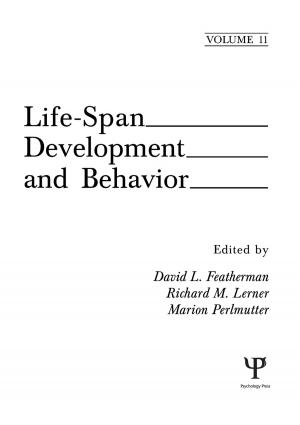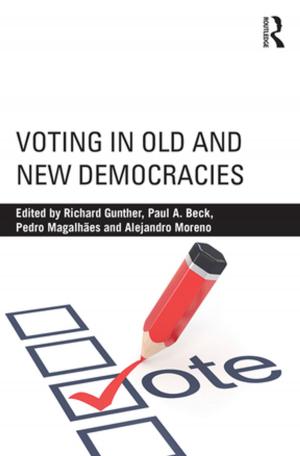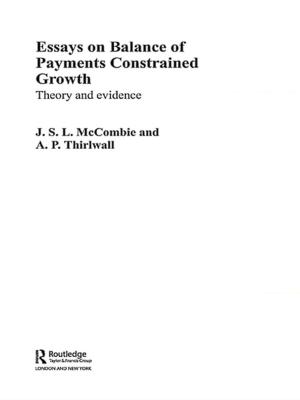Developing Engaged Readers in School and Home Communities
Nonfiction, Reference & Language, Education & Teaching, Teaching, Teaching Methods| Author: | ISBN: | 9781136484148 | |
| Publisher: | Taylor and Francis | Publication: | December 6, 2012 |
| Imprint: | Routledge | Language: | English |
| Author: | |
| ISBN: | 9781136484148 |
| Publisher: | Taylor and Francis |
| Publication: | December 6, 2012 |
| Imprint: | Routledge |
| Language: | English |
This book comprises a synthesis of current directions in reading research, theory, and practice unified by what has been referred to as the engagement perspective of reading. This perspective guides the research agenda of the National Reading Research Center (NRRC), a consortium of the University of Georgia, University of Maryland, and affiliated scholars. A major goal of the book is to introduce reading researchers to the engagement perspective as defined by the NRRC and to illustrate its potential to integrate the cognitive, social, and motivational dimensions of reading and reading instruction. Engaged readers are viewed as motivated, strategic, knowledgeable, and socially interactive. They read widely for a variety of purposes and capitalize on situations having potential to extend literacy.
The book is organized into four sections representing key components of the NRRC research agenda and the engagement perspective. This perspective emphasizes contexts that influence engaged reading. Accordingly, the first section of the volume focuses on the social and cultural contexts of literacy development, with chapters devoted to examining home influences, home-school connections, and the special challenges facing ethnic minorities. The engagement perspective also implies greater attention to the role of motivational and affective dimensions in reading development than traditional views of reading. Therefore, the second section examines motivational theory and its implications for reading engagement, with special attention to characteristics of classroom contexts that promote motivation in reading. The engagement perspective embraces innovative instructional contexts that address the cognitive, social, and motivational aspects of reading. Thus, the third section includes chapters on current directions in promoting children's learning from text, on the value of an integrated curriculum in promoting reading engagement, and on the challenges of assessing students' development as engaged readers. Finally, the broader conception of reading implied by the engagement perspective requires an expanded array of research approaches, sensitive to the complex and interacting contexts in which children develop literacy. The concluding section focuses on these important contemporary issues in literacy research and educational research, with chapters examining the variety of alternative modes of inquiry gaining prominence in literacy research, teacher inquiry, and ethical issues of collaboration between university and teacher researchers.
Intended for university-based researchers, graduate students, and classroom teachers, this volume brings together researchers who think about students and their literacy development in school and home communities in distinctly different ways. The cooperative and collaborative inquiry presented contributes to a richer understanding of the many factors influencing engaged reading.
This book comprises a synthesis of current directions in reading research, theory, and practice unified by what has been referred to as the engagement perspective of reading. This perspective guides the research agenda of the National Reading Research Center (NRRC), a consortium of the University of Georgia, University of Maryland, and affiliated scholars. A major goal of the book is to introduce reading researchers to the engagement perspective as defined by the NRRC and to illustrate its potential to integrate the cognitive, social, and motivational dimensions of reading and reading instruction. Engaged readers are viewed as motivated, strategic, knowledgeable, and socially interactive. They read widely for a variety of purposes and capitalize on situations having potential to extend literacy.
The book is organized into four sections representing key components of the NRRC research agenda and the engagement perspective. This perspective emphasizes contexts that influence engaged reading. Accordingly, the first section of the volume focuses on the social and cultural contexts of literacy development, with chapters devoted to examining home influences, home-school connections, and the special challenges facing ethnic minorities. The engagement perspective also implies greater attention to the role of motivational and affective dimensions in reading development than traditional views of reading. Therefore, the second section examines motivational theory and its implications for reading engagement, with special attention to characteristics of classroom contexts that promote motivation in reading. The engagement perspective embraces innovative instructional contexts that address the cognitive, social, and motivational aspects of reading. Thus, the third section includes chapters on current directions in promoting children's learning from text, on the value of an integrated curriculum in promoting reading engagement, and on the challenges of assessing students' development as engaged readers. Finally, the broader conception of reading implied by the engagement perspective requires an expanded array of research approaches, sensitive to the complex and interacting contexts in which children develop literacy. The concluding section focuses on these important contemporary issues in literacy research and educational research, with chapters examining the variety of alternative modes of inquiry gaining prominence in literacy research, teacher inquiry, and ethical issues of collaboration between university and teacher researchers.
Intended for university-based researchers, graduate students, and classroom teachers, this volume brings together researchers who think about students and their literacy development in school and home communities in distinctly different ways. The cooperative and collaborative inquiry presented contributes to a richer understanding of the many factors influencing engaged reading.















